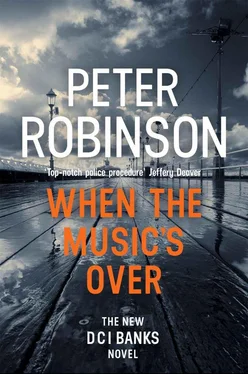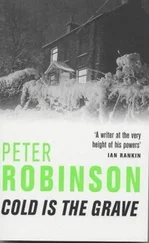He didn’t have much of a back garden, and, though he sometimes went out front and climbed over the wall to sit on the banks of Gratly Beck by the terraced falls, as often as not he spent his evenings in the conservatory. With the windows open, it was almost like being outside. There had been too few evenings spent this way since his promotion. So often he had been stuck with extra paperwork or away overnight on a course or at a conference. Where he was sitting, he could smell the sweetness of the honeysuckle clinging to its trellis, watch the shadows darken on the slopes of Tetchley Fell and the setting sun paint the sky orange and purple along the valley in the west. Times like this, he wondered how he had managed to live in Eastvale at all, let alone London. He imagined Linda Palmer sitting in her garden by the river composing poems. He wished he had that talent, or any writing ability at all. At least, he thought, he should read some of hers. And maybe also Ariel and Dart .
He had recently started working his way through an anthology of English verse he had found in the second-hand bookshop off the market square, often out in the garden with a cup of freshly brewed coffee first thing in the morning. Early encounters with Chaucer and Spenser had almost defeated him, but he had skipped them, along with a number of other unintelligible contemporaries, and moved on. The old ballads presented him with no problems. He already knew most of them from recordings by Martin Carthy, June Tabor and others. He also knew some of Thomas Campion’s songs from Emma Kirkby and Iestyn Davies recordings. Next he breezed through the selection of Shakespeare’s sonnets, then Tichborne’s ‘Elegy’ moved him almost to tears. Now he was feeling a bit bogged down in Pope and Dryden, who probably thought they were wittier than they really were, but he was certain there were more delights to come. Not knowing what was coming next was part of the fun.
It was well after dark and the bats were flitting all over the back garden. Mark Knopfler had finished a while ago. Wearily, Banks put his empty wine glass in the sink and went up to bed. It was no insult to the beauty of the music that he fell asleep with his earbuds in listening to John Tavener’s Lament for Jerusalem .
‘Have you ever been to one of these before?’ Annie asked Gerry as they clicked along the corridor to the post-mortem suite, footsteps echoing from the high ceiling and green-tiled walls. The antiseptic smell made Annie feel vaguely nauseated.
‘No,’ said Gerry.
‘A lot of firsts these days. Nervous?’
‘A bit. I don’t want to make a fool of myself.’
Annie flashed on the time, not so long ago, when she got out of a helicopter feeling airsick and went straight to the scene where half a body had burst out of a bin liner. The left half. As if the victim had been neatly sliced in half from top to bottom with a chainsaw. She had been sick. ‘You won’t,’ she said. ‘Besides, it’s nothing to be ashamed of. Even Alan gets a bit green around the gills when he has to attend one of these. It’s like a murder scene. You never get used to it, but you learn to cope. I suppose the advantage with this sort of thing is it’s all scientific. Sterile. Clinical. Not like finding a girl’s naked body dumped by the roadside.’ Or the left half of a body spilling from the plastic bag on the windswept valley bottom. She turned to Gerry, taking something from her briefcase. ‘Here, put a dab of this under your nose. It’s Vicks. It really does help a bit. The smell in there’s the worst.’
‘Thanks.’ Gerry dabbed the mentholated goo on her upper lip. ‘It reminds of me of when I was a child and my mother would rub it on my chest just before bed when I had a cold.’
‘Exactly,’ said Annie, applying a dab to herself. ‘Dr Glendenning will tease you about it if he smells it. He can be a bit of a jerk — he’s old school — so just ignore him. OK? Ready?’
Gerry nodded and they opened the swing doors and entered the room where Dr Glendenning and his chief anatomical pathology technologist Karen Galsworthy already had the body waiting on the slab. Dr Glendenning glanced over at them. ‘Nice of you to join us, ladies. Why don’t you get yourselves kitted up.’ Then he sniffed theatrically. ‘Someone got a chest cold, have they?’
Annie gave him a dirty look.
They were two minutes early, but Annie was well aware that Dr Glendenning treated everyone who entered his domain as a latecomer. Of course, as he occasionally joked when challenged, most visitors were late. They put on their disposable overalls and hairnets, adding plastic goggles and mouth masks. There was always a chance that the body was infected with some communicable disease, or that bits of bone and flesh would spray up when Dr Glendenning or Karen Galsworthy used the electric saw. You didn’t want a bone fragment in your eye. She hadn’t told Gerry that, of course.
The walls were covered with dazzling white tiles, which made the dirty body on the stainless-steel table seem all the more out of place. Rigor mortis had passed completely now, and the girl lay on her back, arms at her sides. Now that she could see the girl’s face Annie noticed that she had been very pretty even with the bruising, as well as young.
A bulky microphone dangled above the table, and cameras fixed on the walls filmed the procedure from a variety of angles. The surface of the body had already been examined microscopically for any trace evidence, samples taken, and Karen Galsworthy was busy washing it down when they went in. She seemed to be working gently, Annie thought, sadly and respectfully, as a funeral home worker might prepare a body for burial.
The odontologist had been and taken dental impressions, which might help them identify the girl. All he had said, according to Dr Glendenning, was that there was nothing unusual about the dental work. It looked very much, the doctor went on, as if the fist blows came first, knocking her to the ground and stunning her, then a flurry of hard kicks to the head, back, buttocks and chest while she was lying curled in the foetal position. And he was adamant that it had not been a hit and run.
The water sluiced off the mud and filthy water that had dried on the victim’s skin and sent it running into the gutters on either side of the table, then away down the drain. It couldn’t go into the general sewage pipes, Annie knew, in case of blood contaminants and other nasty things, so the resultant mess went into tanks where it had to be specially treated later before it was carefully disposed of.
When Karen had finished, Annie could see that the victim was slim with small, high breasts and long, shapely legs. She was of average height, and everything was in proportion. Her blond hair was parted on the left and fell over her ears and as far as the nape of her neck, showing dark brown roots and two pink streaks.
As always, Dr Glendenning’s first task after the body had been undressed — not necessary today — and examined for trace evidence was to carry out a careful examination of the surface. The removal of the dried mud and scum might have revealed identifying marks or injuries that hadn’t been noticed before. This case was no exception. Dr Burns had estimated time of death at the scene between one and three in the morning. Dr Glendenning didn’t disagree or put forward a shorter time period. He pointed out the dark bruise-like stripe down her left side, interrupted where her hip and shoulder had touched the ground, and the bruising around the broken right hip. ‘Post-mortem lividity indicates she died in the position she was found — on her left side, curled up — and that the body wasn’t moved,’ he said. ‘There are signs of a bit of scavenger activity — it was a warm night — but not too much. I’ve seen the crime-scene photos, and she was still in the foetal position when she was brought in here last night, so in my opinion Dr Burns is right, and she was protecting herself from a rain of blows. Or trying to.’ He pointed to cuts on her hips and upper thighs. ‘And I’ve matched these with the samples of barbed wire and broken glass recovered from the scene.’
Читать дальше












